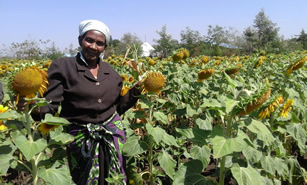
Through implementation of market-based approaches to farming, ICL aims to build the capacity of small holder farmers to commercialize agriculture and move away from subsistence production. This is in a bid to support farmers contribute to local economies as well as improve their own livelihoods.
 Agriculture has been cited as having potential to create employment to the youth and women in the country. Kenya’s macro economic framework Vision 2030 whose main thrust is to transform Kenya into a middle income country by the year 2030 positions the agricultural sector as a key driver for delivering the 10 per cent annual economic growth rate envisaged under the economic pillar of Vision 2030. A key thrust of the current agricultural development strategy is to increase productivity, commercialization and competitiveness of agricultural commodities and enterprises.
Agriculture has been cited as having potential to create employment to the youth and women in the country. Kenya’s macro economic framework Vision 2030 whose main thrust is to transform Kenya into a middle income country by the year 2030 positions the agricultural sector as a key driver for delivering the 10 per cent annual economic growth rate envisaged under the economic pillar of Vision 2030. A key thrust of the current agricultural development strategy is to increase productivity, commercialization and competitiveness of agricultural commodities and enterprises.Establishment of demonstration farms used as learning centers where farmers access practical training on farming.
Features
Benefits

Farmers equipped with business development skills to run and manage their farms as business enterprises.
Features:
Benefits

Involves processing farm goods to transform them into products of greater worth, with a longer shelf-life, that can earn producers additional income.
Features
Benefits
To Increase the Life Chances for Marginalized girls in Kenya
Introduction:
The Girls’ Education Challenge (GEC) seeks to help up to 1 million of the world’s poorest girls improve their lives through education. According to a baseline Survey conducted by ICL in three counties (Meru, Mombasa and Laikipia Counties) ,one of the main barrier to girls attending and completing a full cycle of education is inability for the parents to pay school fees on time. This because most of these parents live on less than a dollar a day and hence cannot afford to pay and keep the girl in School and hence one of the intervention is geared towards economically empowering the parents to begin and run profitable enterprises that generate adequate income that enable them to pay school fees for the girls.
Project Goal: 10, 170 marginalized girls in Kenya able to complete full cycle of education and demonstrate learning.
Overall Objective: To strengthen target communities to develop mechanisms that encourage girls to attend and stay in school
Specific Objective
Achievements:
Scope:

This project targets to Economically Empower the parents and students
Slogan: Increasing life opportunities for youth!